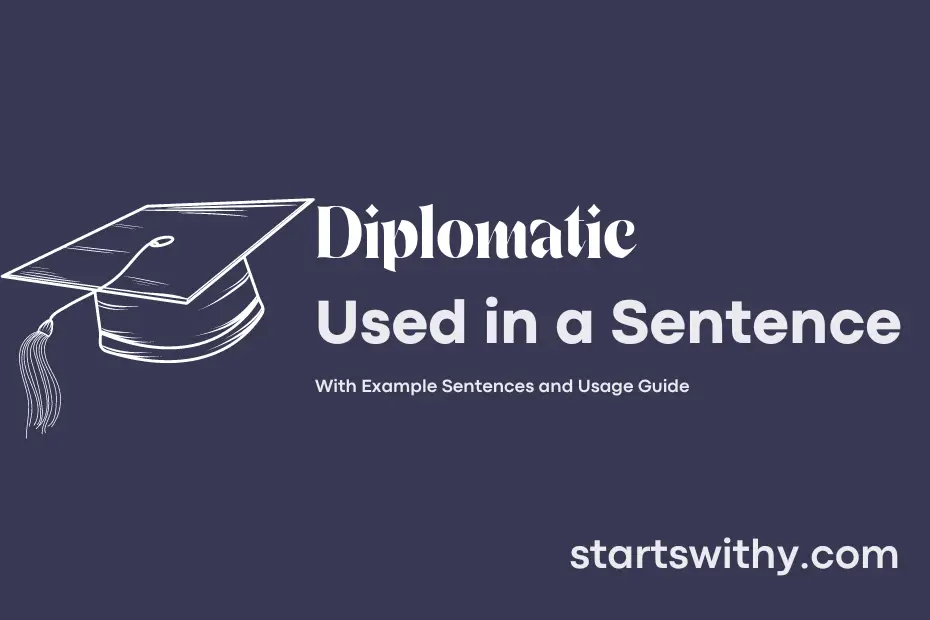Navigating diplomatic communication requires finesse and tact. When interacting in a diplomatic manner, individuals convey their thoughts and opinions in a respectful and considerate way, often aiming to cultivate harmony and understanding in their interactions. It involves choosing words carefully and being mindful of the impact they may have on others.
Diplomatic communication is essential in various settings, such as international relations, business negotiations, and personal relationships. It allows individuals to express themselves effectively while maintaining positive relationships with others. Mastering the art of diplomatic communication can lead to successful conflict resolution, improved collaboration, and strengthened connections with others.
7 Examples Of Diplomatic Used In a Sentence For Kids
- Teachers often use diplomatic words to solve problems in the classroom.
- Friends can be diplomatic by using kind words when they have a disagreement.
- It is important to be diplomatic and polite when talking to others.
- Leaders around the world use diplomatic skills to build relationships with other countries.
- We can be diplomatic by listening to others and trying to understand their feelings.
- Diplomatic people are good at finding solutions that make everyone happy.
- When we are diplomatic, we can help make the world a better place.
14 Sentences with Diplomatic Examples
- In group discussions, it’s important to be diplomatic when presenting conflicting opinions.
- When handling disagreements with roommates, it’s best to maintain a diplomatic attitude to avoid further tensions.
- During class debates, it’s essential to stay diplomatic and respectful towards classmates’ perspectives.
- When discussing project ideas with team members, remember to be diplomatic in expressing your thoughts.
- In student council meetings, it’s crucial to have diplomatic communication to reach consensus on important decisions.
- When addressing issues with professors, it’s advisable to be diplomatic and professional in your approach.
- While negotiating deadlines with group mates, it’s beneficial to be diplomatic in finding a compromise that suits everyone.
- In student leadership roles, being diplomatic is key to effectively mediating conflicts among peers.
- When seeking support from faculty members, it’s advantageous to be diplomatic in your requests to ensure a positive outcome.
- During study group sessions, it’s helpful to maintain a diplomatic tone when discussing different study methods.
- When giving feedback on classmates’ work, it’s important to be diplomatic in your critiques to foster a constructive learning environment.
- In challenging group projects, being diplomatic can help navigate conflicting ideas and perspectives smoothly.
- When discussing sensitive topics in class, it’s best to approach the conversation in a diplomatic manner to respect all viewpoints.
- In internship interviews, demonstrating diplomatic communication skills can leave a positive impression on potential employers.
How To Use Diplomatic in Sentences?
Diplomatic refers to the skill or behavior of dealing with others in a sensitive and effective way, especially in difficult situations. To use diplomatic in a sentence, start by identifying a situation where a person needs to handle a potential conflict with care and consideration.
For example, “She was very diplomatic when discussing the controversial topic, making sure to consider everyone’s feelings.”
When using diplomatic in a sentence, it is important to focus on maintaining harmony and tact in communication. Avoid being overly aggressive or confrontational, as diplomatic language aims to resolve conflicts or disagreements peacefully.
Additionally, consider the context in which you are using the word diplomatic. It can be used to describe a person’s behavior, a conversation, a decision, or a relationship. Make sure the sentence accurately reflects the intended meaning of the word and its context.
Remember, using diplomatic language can be a valuable skill in navigating challenging situations, promoting understanding, and fostering positive relationships with others. Practice incorporating diplomatic language in your everyday conversations to improve your communication skills and enhance your interpersonal relationships.
Conclusion
In conclusion, utilizing diplomatic language in conversations, negotiations, and written communication is crucial for maintaining positive relationships, resolving conflicts, and achieving mutual understandings. Diplomatic sentences can help convey sensitive information tactfully, bridge differences in opinions, and foster harmonious interactions between individuals and nations. By choosing words carefully and considering the impact of their message, individuals can navigate tricky situations, build trust, and promote cooperation.
In both personal and professional contexts, mastering the art of diplomatic communication can lead to successful outcomes, prevent misunderstandings, and promote peaceful resolutions. Whether in diplomatic missions, international diplomacy, business negotiations, or everyday interactions, the ability to craft diplomatic sentences can serve as a powerful tool for building rapport, promoting collaboration, and fostering a culture of respect and understanding.



